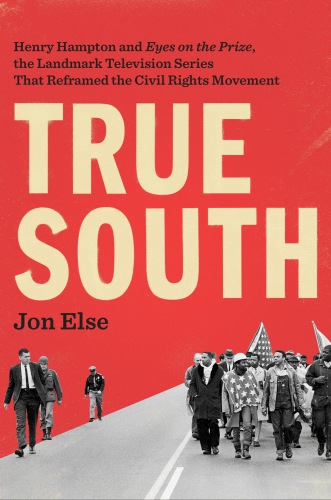
True South
Henry Hampton and "Eyes on the Prize," the Landmark Television Series That Reframed the Civil Rights Movement
کتاب های مرتبط
- اطلاعات
- نقد و بررسی
- دیدگاه کاربران
نقد و بررسی

November 7, 2016
Else, an accomplished documentarian, chronicles the making of the 1987 TV civil rights documentary Eyes on the Prize, created by Henry Hampton, in this ambitious, sweeping chronicle. Hampton emerges as a charismatic leader whose vision was inspiring enough to draw in an amazing team despite his scattered management style. Else, a producer on the series, also describes his own time participating in the 1960s civil rights movement as a member of the Student Nonviolent Coordinating Committee (SNCC). In recounting how Hampton and his colleagues treated various turning points—the murder of Emmett Till in 1954 and of three civil rights workers in 1963; the 1955–1956 Montgomery, Ala., bus boycott; the 1965 Selma-to-Montgomery marches; and many more—Else finds a new perspective on famous events. In effect, the reader gets to ask the same narrative questions as the documentarians, and feel the same mixture of satisfaction and disappointment when one narrative avenue is chosen over another. Footage isn’t unavailable or is mislabeled; eyewitnesses die or exaggerate or don’t want to speak at all. Doubtless there were struggles in Prize’s making that Else doesn’t cover, but his account feels thorough and important as a part of both social and documentary film history. Agent: Flip Brophy, Sterling Lord Literistic.

November 1, 2016
Memoir, history, and biography meld in this account of the creation of a famed civil rights documentary.Producer and cinematographer Else (Journalism/Univ. of California Graduate School of Journalism), a MacArthur Fellow whose honors include several Peabody awards and four Emmys, offers a revealing chronicle of the making of the 1987 PBS series Eyes on the Prize. The author became involved in the civil rights movement in 1963 when he was a 19-year-old college student and took up political activist Allard Lowenstein's challenge to "draw fire and publicity in Mississippi" by registering black voters. John Kennedy and Medgar Evers had just been shot, and Else was filled with "missionary zeal." In 1964, he left school to work in Mississippi full time, courting danger in an area where the Ku Klux Klan flourished. Twenty years later, responding to an article in a Corporation for Public Broadcasting newsletter, he "cold-called" Henry Hampton, involved in a project to produce a TV series about the civil rights struggle. Else characterizes Hampton, who had joined the NAACP as an undergraduate at Washington University and who stood with Martin Luther King Jr. on the Pettus bridge in Selma, as nothing less than a genius, a "visionary leader" who "insisted on a bold multicultural, multiethnic, collaborative production process" that involved men and women, blacks and whites: "For him, diversity in teams trumped the powerful statement that an all-black production would have made." Hampton also privileged the voices of ordinary men and women who participated in the movement rather than focus on people and images that had, by 1985, become iconic. Hampton viewed the civil rights movement "as a patriotic story of America's realization of its ideals" and wanted white Americans to react positively to it. In detailing the financial struggle involved and the arduous process of finding interviewees and eliciting their stories, Else reveals the complexities of any such production. An illuminating look at racial strife and TV history.
COPYRIGHT(2016) Kirkus Reviews, ALL RIGHTS RESERVED.

December 1, 2016
In 1987, Henry Hampton's landmark television series, Eyes on the Prize, premiered on PBS, mixing archival footage with current interviews on the U.S. civil rights movement. The series changed documentary filmmaking and the country's understanding of the movement. Yet, the production of the series pushed Blackside, Inc., Hampton's film company in Boston, to its limits. Cinematographer Else (journalism, Univ. of California, Berkeley) has written a history of the making of the groundbreaking film in time for its 30th anniversary. Chapters move between Else's time working with the civil rights movement and his work on the documentary, where he revisited some of the worst atrocities of racism in the 20th century. While this book provides insight into the work of rediscovering forgotten stories from the movement, Else does not shy away from controversies such as the intellectual property lawsuits that were filed by the Martin Luther King Jr. estate. VERDICT This mix of memoir, civil rights history, and film history provides another layer to the unforgettable series it documents.--John Rodzvilla, Emerson Coll., Boston
Copyright 2016 Library Journal, LLC Used with permission.

Starred review from December 15, 2016
Distinguished documentarian and MacArthur fellow Else has written a hard-driving, avidly detailed, and dramatic history of the making of Eyes on the Prize, the pioneering 1987 television documentary series about the civil rights movement. His uniquely knowing account is powered by his adventures as series producer and enriched by his vivid and admiring portrait of Henry Hampton (194098), the visionary genius and polio survivor who created the series. Their close working relationship was rooted in their experiences working in the early voter-registration efforts in the South. Else crisply illuminates Hampton's mission to focus on the ordinary African Americans who refused to be victims of racism and were, instead, courageous and strategic agents for change. Hampton's radical and progressive innovations extended to his production company, and Else tracks the racist, sexist, political, and financial obstacles confronting Hampton's multicultural, gender-equal, chronically underfunded, talented, and committed staff. In his seemingly frame-by-frame account, Else covers the evolution of American historical television documentaries while telling riveting tales of the epic research, endless production difficulties, and sensitive aesthetic choices that resulted in the triumphant success and lasting influence of Eyes on the Prize. With its many hooks and avenues, compelling portraits, and thought-provoking revelations, this in-depth chronicle of the making of a defining civil rights documentary is an invaluable and timely work.(Reprinted with permission of Booklist, copyright 2016, American Library Association.)

























دیدگاه کاربران